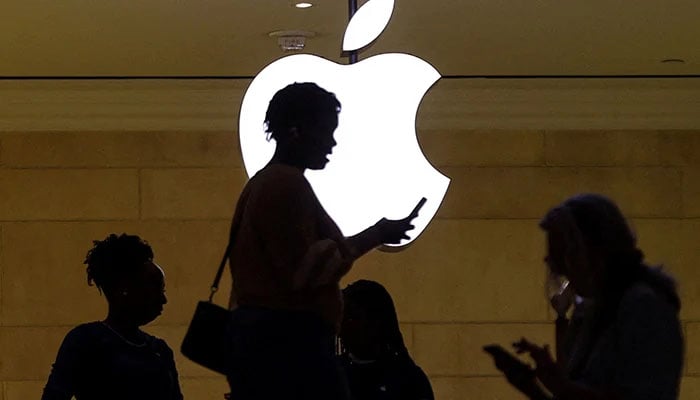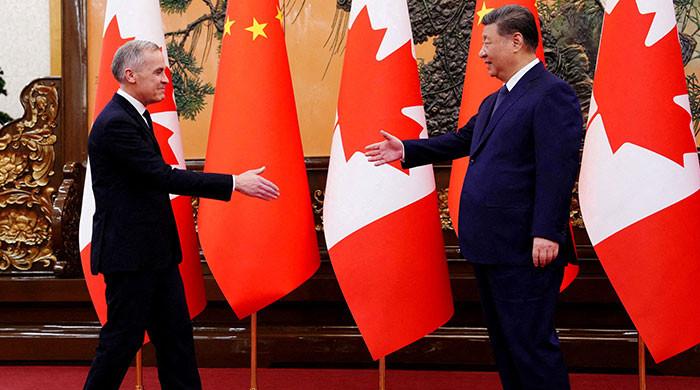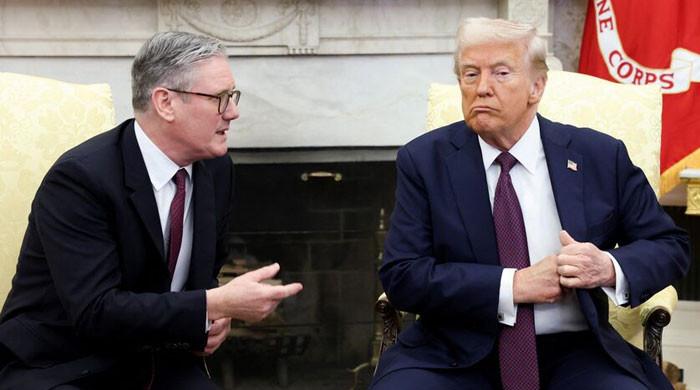Trump re-escalates trade threats, takes aim at European Union, Apple
EU Commission says it will wait for phone call between EU trade chief and his US counterpart
May 23, 2025

US President Donald Trump threatened once again on Friday to intensify his trade war, recommending a 50% tariff on European Union goods starting June 1, and warning Apple that he may impose a 25% tariff on any iPhones manufactured outside the US.
The twin threats, delivered via social media, roiled global markets after weeks of de-escalation had provided some reprieve. The S&P 500 fell 1.2% in early trading, the Nasdaq fell 1.5%, and European shares fell 1.7%.
Shares in Germany’s carmakers and luxury companies — some of the most exposed to tariffs — fell on the news. Porsche, Mercedes and BMW were down between 2% and 4.5%. Sunglasses company EssilorLuxottica was 5.5% lower.
Shares of Apple fell 3.7% in pre-market trading, along with the shares of other technology bellwethers. Trump did not give a timeframe for his warning to Apple. More than 60 million phones are annually sold in the United States, but the country has no smartphone manufacturing.
"The European Union, which was formed for the primary purpose of taking advantage of the United States on TRADE, has been very difficult to deal with," Trump wrote on his Truth Social site. "Our discussions with them are going nowhere!"
The EU Commission on Friday declined to comment the new 50% tariff threat, saying it would wait for a phone call between EU trade chief Maros Sefcovic and his US counterpart Jamieson Greer.
Envoys from the 27 EU countries are due to meet on trade in Brussels later on Friday.
EU's total exports last year to the United States totalled about 500 billion euros, with Germany [161 billion euros], Ireland [72 billion euros] and Italy [65 billion euros] — the three largest exporters. Pharmaceuticals, cars and auto parts, chemicals and aircraft were among the largest exports, according to EU data.
"The EU is one of Trump's least favorite regions, and he does not seem to have good relations with its leaders, which increases the chance of a prolonged trade war between the two," said Kathleen Brooks, research director at XTB.
Export-oriented car companies in Europe — most notably Germany's major automakers — are heavily exposed, with few near-term options other than smaller discounts and price increases.
Porsche and Volkswagen's Audi have no US production. Some, including Audi and Volvo Cars, have already said they will move some production.
Volvo Cars CEO Hakan Samuelsson told Reuters on Friday that customers would have to pay a large part of tariff-related cost, and that it could become impossible to import the smallest cars in the company's lineup to the United States.
But he remained hopeful that Europe and the United States will soon come to an agreement.
"I believe there will be a deal soon. It could not be in the interest of Europe or the US to shut down trade between them," Samuelsson said.
Optimism 'wiped out'
Trump had sent markets reeling in early April after imposing tariffs on almost every inhabited local around the world, including a massive tax of about 145% on imported goods from China. Investors responded by furiously selling US assets, as the levies caused them to question the safe-haven status that America has long enjoyed, and while markets have recovered, business and consumer confidence has plunged in the United States.
The shock response forced the White House to pause most tariffs through early July, leaving in place a 10% tax on most imports from other nations and 30% on most Chinese goods. But Trump held out the possibility of reviving certain levies.
The White House has been in negotiations with numerous countries over trade issues, but progress has been unsteady. Finance leaders from the Group of Seven industrialised democracies tried to downplay disputes over the tariffs earlier this week at a forum in the Canadian Rocky Mountains.
"All the optimism over trade deals wiped out in minutes — seconds, even," wrote Fawad Razaqzada, market analyst at City Index and FOREX.com, in a note on Friday.
Targeting apple
"I have long ago informed Tim Cook of Apple that I expect their iPhones, that will be sold in the United States of America, will be manufactured and built in the United States, not India, or anyplace else," Trump said in a post on Truth Social on Friday morning, referring to the Apple CEO.
"If that is not the case, a tariff of at least 25% must be paid by Apple to the US"
It is not clear whether a tariff on an individual company would face legal hurdles. Apple declined to comment on Trump's threat.
In response to market upheaval, the White House had granted exclusions from steep tariffs on smartphones and some other electronics imported largely from China, a break for Apple and other tech firms that rely on imported products.
Apple aims to make most of its iPhones sold in the United States at factories in India by the end of 2026, and is speeding up those plans to navigate potentially higher tariffs in China, its main manufacturing base, a source told Reuters.
But Trump and others, including Commerce Secretary Howard Lutnick, have suggested Apple could make iPhones in the United States. In February, Apple said it will spend $500 billion over four years to expand hiring and facilities in nine American states, but it did not say the investment would go towards bringing iPhone manufacturing to the US
The iPhone maker said most of its smartphones sold in the United States would originate from India in the June quarter.
"It is hard to imagine that Apple can be fully compliant with this request from the president in the next 3-5 years," D.A. Davidson & Co analyst Gil Luria said.











